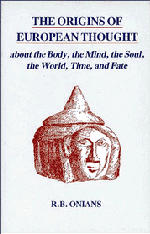Book contents
- Frontmatter
- Contents
- Preface to the first edition
- Preface to the second edition
- Introduction: The Earliest Greeks
- PART I THE MIND AND THE BODY
- PART II THE IMMORTAL SOUL AND THE BODY
- PART III FATE AND TIME
- Chapter I ‘On the Knees of the Gods’
- Chapter II Πείρατα
- Chapter III Καιρός
- Chapter IV The Weaving of Fate
- Chapter V Other Peoples—Fate and Magic
- Chapter VI Μοῖραν ἐπιτιθέναι, πεπρωμένος, etc.
- Chapter VII ʿΥπὲρ μόρον and the Relation of the Gods of Fate
- Chapter VIII The Jars of Zeus, the Scates of Zeus, and the Κῆρες
- Chapter IX Time—Ἦμαρ
- Chapter X Lachesis, Klotho, and Atropos
- Chapter XI Phases of Body and Mind, Sorrow, Sleep, Death, etc.
- Chapter XII Τέλος
- ADDENDA
- Indexes
Chapter VI - Μοῖραν ἐπιτιθέναι, πεπρωμένος, etc.
Published online by Cambridge University Press: 06 August 2010
- Frontmatter
- Contents
- Preface to the first edition
- Preface to the second edition
- Introduction: The Earliest Greeks
- PART I THE MIND AND THE BODY
- PART II THE IMMORTAL SOUL AND THE BODY
- PART III FATE AND TIME
- Chapter I ‘On the Knees of the Gods’
- Chapter II Πείρατα
- Chapter III Καιρός
- Chapter IV The Weaving of Fate
- Chapter V Other Peoples—Fate and Magic
- Chapter VI Μοῖραν ἐπιτιθέναι, πεπρωμένος, etc.
- Chapter VII ʿΥπὲρ μόρον and the Relation of the Gods of Fate
- Chapter VIII The Jars of Zeus, the Scates of Zeus, and the Κῆρες
- Chapter IX Time—Ἦμαρ
- Chapter X Lachesis, Klotho, and Atropos
- Chapter XI Phases of Body and Mind, Sorrow, Sleep, Death, etc.
- Chapter XII Τέλος
- ADDENDA
- Indexes
Summary
There remain to be considered Homer's other expressions for fate. εἵμαρται, ‘it has been apportioned’, and θέσϕατόν ἐστι, ‘it is ordained’, need not be discussed. What however of μοīρα and αἶσα? Their obvious meaning, and that which in other contexts they possess, is just ‘portion’. Of the personified powers thus named, as also of simple expressions such as ὣς γάρ οἱ μοĩρʾ ἐστι ϕίλους ἰδέειν (Od. v, 41), we need say little, since they, like εἵμαρται, reveal nothing as to the form under which the μοĩρα is conceived. If we exclude these, there are left several expressions hitherto unexplained. Helen says to Hector: ‘Sit; for you are wearied on account of my shameless self and of the ἃτη of Paris, on our account,
οἶσιν ἐπί Ζεὺς θῆκε κακὸν μόρον ὡς καὶ ὀπίσσω
ἀνθρώποισι πελώμεθʾ ἀοίδιμοι έσσομένοισιʾ;
similarly Odysseus seeks to comfort Aias for his wrongs:
οὐδέ τις ἄλλος
αἴτιος, ἀλλὰ Ζεὺς Δαναῶν στρατὸν αἰχμητάων
ἐκπάγλως ἔχθαιρε, τεῒν δʾ ἐπὶ μοĩραν ἔθηκεν.
The expression is clearly spatial ‘placed upon’, yet commentators are content with a vague paraphrase ‘assigned to’ and make no attempt to explain the image. What however are Homer's other uses of ἐπι-τιθέναι with a personal object?
αὐτὰρ ἐπὶ στεϕάνην κεϕαλῆϕιν ἀείρας
θήκατο χαλκείην.
And under what form have we seen a man's portion, his fortunes, to be conceived?
- Type
- Chapter
- Information
- The Origins of European ThoughtAbout the Body, the Mind, the Soul, the World, Time and Fate, pp. 378 - 389Publisher: Cambridge University PressPrint publication year: 1988



